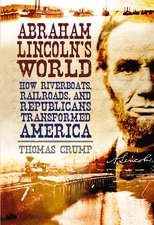Jimmy Carter: Foreign Policy and Post-Presidential Years: Contributions in Political Science
Editat de Herbert D. Rosenbaum, Alexej Ugrinskyen Limba Engleză Hardback – 29 oct 1993 – vârsta până la 17 ani
Din seria Contributions in Political Science
- 38%
 Preț: 438.51 lei
Preț: 438.51 lei - 27%
 Preț: 441.64 lei
Preț: 441.64 lei - 28%
 Preț: 436.80 lei
Preț: 436.80 lei - 38%
 Preț: 437.47 lei
Preț: 437.47 lei - 38%
 Preț: 345.58 lei
Preț: 345.58 lei - 24%
 Preț: 460.68 lei
Preț: 460.68 lei - 27%
 Preț: 444.08 lei
Preț: 444.08 lei - 38%
 Preț: 437.84 lei
Preț: 437.84 lei - 22%
 Preț: 231.81 lei
Preț: 231.81 lei - 38%
 Preț: 436.57 lei
Preț: 436.57 lei - 27%
 Preț: 346.07 lei
Preț: 346.07 lei - 27%
 Preț: 345.74 lei
Preț: 345.74 lei - 28%
 Preț: 436.99 lei
Preț: 436.99 lei - 38%
 Preț: 345.30 lei
Preț: 345.30 lei - 28%
 Preț: 437.91 lei
Preț: 437.91 lei - 23%
 Preț: 171.93 lei
Preț: 171.93 lei - 28%
 Preț: 344.63 lei
Preț: 344.63 lei - 27%
 Preț: 437.84 lei
Preț: 437.84 lei - 38%
 Preț: 438.41 lei
Preț: 438.41 lei - 23%
 Preț: 223.20 lei
Preț: 223.20 lei - 28%
 Preț: 437.57 lei
Preț: 437.57 lei - 38%
 Preț: 346.00 lei
Preț: 346.00 lei - 27%
 Preț: 346.50 lei
Preț: 346.50 lei - 28%
 Preț: 438.07 lei
Preț: 438.07 lei - 27%
 Preț: 439.09 lei
Preț: 439.09 lei - 38%
 Preț: 436.99 lei
Preț: 436.99 lei - 28%
 Preț: 435.65 lei
Preț: 435.65 lei - 38%
 Preț: 438.17 lei
Preț: 438.17 lei - 38%
 Preț: 346.25 lei
Preț: 346.25 lei - 23%
 Preț: 229.50 lei
Preț: 229.50 lei - 27%
 Preț: 440.79 lei
Preț: 440.79 lei - 38%
 Preț: 345.83 lei
Preț: 345.83 lei - 38%
 Preț: 438.00 lei
Preț: 438.00 lei - 28%
 Preț: 437.84 lei
Preț: 437.84 lei - 38%
 Preț: 436.99 lei
Preț: 436.99 lei - 27%
 Preț: 438.67 lei
Preț: 438.67 lei - 28%
 Preț: 438.07 lei
Preț: 438.07 lei - 11%
 Preț: 356.63 lei
Preț: 356.63 lei - 28%
 Preț: 438.00 lei
Preț: 438.00 lei - 32%
 Preț: 231.69 lei
Preț: 231.69 lei - 38%
 Preț: 438.41 lei
Preț: 438.41 lei - 28%
 Preț: 461.11 lei
Preț: 461.11 lei - 32%
 Preț: 231.89 lei
Preț: 231.89 lei - 19%
 Preț: 182.01 lei
Preț: 182.01 lei - 38%
 Preț: 436.47 lei
Preț: 436.47 lei - 38%
 Preț: 439.17 lei
Preț: 439.17 lei - 38%
 Preț: 437.07 lei
Preț: 437.07 lei
Preț: 445.00 lei
Preț vechi: 608.31 lei
-27% Nou
Puncte Express: 668
Preț estimativ în valută:
85.15€ • 88.91$ • 70.31£
85.15€ • 88.91$ • 70.31£
Carte tipărită la comandă
Livrare economică 15-29 aprilie
Preluare comenzi: 021 569.72.76
Specificații
ISBN-13: 9780313288449
ISBN-10: 0313288445
Pagini: 526
Dimensiuni: 156 x 235 x 29 mm
Greutate: 0.91 kg
Ediția:New.
Editura: Bloomsbury Publishing
Colecția Praeger
Seria Contributions in Political Science
Locul publicării:New York, United States
ISBN-10: 0313288445
Pagini: 526
Dimensiuni: 156 x 235 x 29 mm
Greutate: 0.91 kg
Ediția:New.
Editura: Bloomsbury Publishing
Colecția Praeger
Seria Contributions in Political Science
Locul publicării:New York, United States
Notă biografică
HERBERT D. ROSENBAUM recently retired from his position as Professor of History at Hofstra University. He was the Director of the Conference on the Presidency of Franklin D. Roosevelt in 1982, and was also the co-editor of the proceedings of this FDR conference. He was also Director of the Jimmy Carter Conference.ALEXEJ UGRINSKY is Director of Documentation, Finance, and Planning at the Hofstra Cultural Center. Both have served as editors for earlier volumes of the Hofstra Presidency Series published in conjunction with Greenwood Press.
Cuprins
Preface by Herbert D. RosenbaumMajor Principles and Guidelines of the Carter Foreign PolicyOverviewsAn Examination of the Carter Administration's Selection of Secretary of State and National Security Advisor by Lawrence X. CliffordPresident Carter, Western Europe, and Afghanistan in 1980: Inter-Allied Differences over Policy toward the Soviet Invasion by Minton F. GoldmanThe Rise and Fall of America's First Post-Cold War Foreign Policy by Jerel A. RosatiNegotiations at Home and Abroad: Carter's Alternatives to Conflict and War by Kenneth W. ThompsonHuman RightsFree Elections Based on Human Rights Protection: The Carter Contribution by Henry F. CareyAmerican-Romanian Relations, 1977-1981: A Case Study in Carter's Human Rights Policy by Joseph HarringtonCarter's Human Rights Policy: Political Idealism and Realpolitik by Vernon J. VavrinaMiddle East Problems and PoliciesThe Middle East Peace ProcessNational and International Consequences of Ambassador Andrew Young's Meeting with PLO Observer Terzi by Bartlett C. JonesDid President Carter Miss an Opportunity for Peace between Israel and Jordan--Or is the "Jordanian Option" Still a Viable Solution? by Samuel SegevThe Camp David AccordsThe Iran Hostage CrisisThe Iranian Hostages Case: Its Implications for the Future of International Law of Diplomacy by Michael M. GunterThe Deportation of Iranian Students during the Iranian Hostage Crisis by Christine ReillyThe Iran Rescue Mission: A Case Study in Executive Distrust of Congress by Frank J. Smist, Jr.The Carter Administration and the Third WorldAfrica and AsiaPrincipled Pragmatism: Carter, Human Rights, and Indo-American Relations by Srinivas M. CharyManaging Foreign Policy: Carter and the Regionalist Experiment toward Africa, January 1977-May 1978 by R. Benneson DeJanesThe Reaction of the Carter Administration to Human Rights Violations in Cambodia by Carl LiebermanThe Panama Canal TreatiesForeign Policy Interest Groups and Presidential Power: Jimmy Carter and the Battle over the Ratification of the Panama Canal Treaties by David SkidmoreThe United States and the USSRThe Carter Administration, the Senate, and SALT II by Dan CaldwellAn Offered Hand Rejected? The Carter Administration and the Vance Mission to Moscow in March 1977 by Vladislay ZubokThe Past as PrologueThe Post-Presidency and the Carter CenterJimmy Carter: The Post-Presidential Years by Steven H. HochmanJimmy Carter Rehabilitated: Post-Presidential Press and Early Revisionism by Mark J. RozellBanquet AddressThe Unchanging Jimmy Carter by Robert S. StraussHigh School Colloquium and Town MeetingIndex














